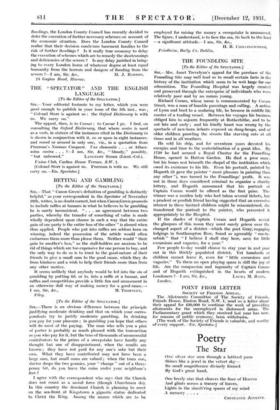BETTING AND GAMBLING [To the Editor of the SPECTATOR.] SIR,—That
" Canon Green's definition of gambling is distinctly helpful," as your correspondent in the Spectator of November 28th, writes, is no doubt correct, but when Canon Green proceeds to include raffles at bazaars in what he believes to be gambling he is surely inconsistent. " . . . an agreement between two parties, whereby the transfer of something of value is made wholly dependent upon chance in such a way that the entire gain of one party is the entire loss of the other " is absurd when thus applied. People who put into raffles are seldom keen on winning, indeed the possession of the article would often embarrass them more than please them: Neither would " their gain be another's lais," as the stall-holders are anxious to be rid of things which are too expensive for one person to buy, and the only way to do so is to trust to the -good-nature of their friends to give a small sum to the good cause, which they do from kindness and a wish to help their friends inure than from any other motive.
It seems unlikely that anybody would be led into the sin of gambling by putting ad. or ls. into a raffle at 'a bazaar, and raffles and competitions provide a little fun and amusement in an otherwise dull way of making money for a good cause.—










































 Previous page
Previous page